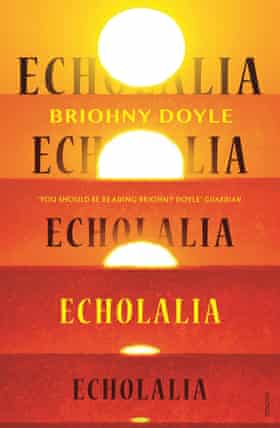Echolalia is a strange word. “It’s a beautiful word that describes speech patterns of autistic and neurotypical children’s development: they repeat what you say to them,” explains Briohny Doyle.
For this Australian author, it’s also freighted with allegory: Echolalia is the title of Doyle’s latest novel. “The book is structured around the repetitions we unconsciously make, mimicry and learned behaviour, and about echoes in general, across time and generations,” she says.
Echolalia is Doyle’s third book: her debut, The Island Will Sink, was a futuristic ecological disaster novel, and she followed it up with nonfiction: Adult Fantasy was a work of cultural criticism about millennials grasping to live up to societal expectations. This time round, back in the realm of the fictional, Doyle’s landscape is not flood-drenched but drought-stricken.
Written in the third person, with a narrative that alternates between Before (circa 2010) and After (circa 2025), Echolalia pivots on a single traumatic event but its ambit is far more reaching; the event is like the crest of a wave that generates ripples across time. “What actions in the present already foreshadow the future?” Doyle asks. “I wanted Echolalia to examine unquestioned ideologies, political agendas and the relationships we have where we unconsciously repeat these networks of power. What are the potential consequences of that and how are we co-responsible for what happens?”
Set in a fictional regional town of Shorehaven, in the middle of which a palatial house sits like a haughty imposition, Echolalia is all about surfaces and depths. On the face of it, Emma Cormac seems to have it all: a marriage into an old-money property development dynasty; a winsome chinos-and-polo-wearing husband, three beautiful children and a helpful mother-in-law. Along with the five-bedder and the Audi, “her life in tableau was accidentally perfect”. However, beneath the sheen – and thanks in part to the relentless demands of a four-year-old, a toddler and a baby – her “attention, strength, memory, enthusiasm for anything is a dwindling resource”. What follows is a tale of prosperity’s irrevocable slide into decrepitude.
“She’s entirely fictional,” Doyle says of her main character. “But I read an article about a woman in the town where I grew up who was home alone with her three kids and she’d been under a lot of stress. The book is my attempt to read between the lines.”
Also diminishing is the body of water near the Cormacs’ property. What used to be a glistening circle is now a dry lakebed. This evaporating water is in direct correlation to Emma’s own arid state, “an extension of her inner ebb”.
“There are broader conversations to be had about the circumstances that exacerbate mental illness,” says Doyle. “Who else takes part in creating this rupture? I wanted to question the idea of culpability, the interconnectedness of individuals to families and to the larger world.”

The protagonist’s drained emotional well and the unrelenting heat of Shorehaven are congruent with the author’s continuing interest in futurity, environmental degradation and climate change, topics that she first addressed in The Island Will Sink.
But Echolalia is also about motherhood, and Doyle writes perceptively and sympathetically about Emma’s struggles with circumstances both internal and external. Emma had married into a robust family and gained a valuable surname, but at what cost?
“Refusing to acknowledge certain realities – mental health issues or addiction, for instance – doesn’t make them go away. If anything it creates a performative, self-effacing reality that isolates and annihilates. This is the case for the Cormac family. It also applies on a broader scale to Australia, where we serially legislate to scaffold denial,” Doyle says, referring to issues such as discrimination against Indigenous people in the justice system, government inaction on climate crisis, and the social disadvantages entrenched in capitalism.
Doyle’s second book, Adult Fantasy, chartered generational rivalry as well as societal expectations of reaching the milestones of adulthood, but though her protagonist in Echolalia has acquired the requisite trifecta of a marriage, a house and a brood of kids, Emma’s disaffection is overwhelming. There’s a sense that Doyle is extending her interest in examining the mythologies of adulthood from her earlier work.
Though childless, Doyle did an abundance of archival and contemporary research into the experience of motherhood. “I spent a lot of time in forums. I’m 38, have close friendships with women who are either having children or thinking about them or going through IVF. Motherhood, fertility and babies have been writ large in my life whether or not I’ve wanted to investigate it critically,” she says.
“Part of the whole myth of motherhood is that it’s supposed to be fantastic and fulfilling even when it’s hard work. It’s a constructed experience, the way it’s situated culturally in the social narratives we create, and those exist for everyone, not just for mothers.”
Echolalia also forces the reader to confront the brutal reality of climate change, of mental health incapacities and the wilful neglect thereof of both.
“It’s a fallacy that denying reality will somehow evade it. Because sure, pretend that your children will grow up in the same world that you did but it won’t help them or you,” Doyle says.
“There are points in the novel where even the staunchest believers in the myth of the white Australian entitlement have to dwell on this. Because there’s no monster in this novel. Everyone is working together to shore up the antagonism and cruelty that facilitates their tragedy.”

Average Rating